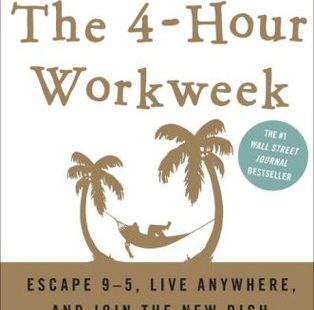Disclosure: I may earn affiliate revenue or commissions if you purchase products from links on my website. The prospect of compensation does not influence what I write about or how my posts are structured. The vast majority of articles on my website do not contain any affiliate links.
4-Hour Workweek by Timothy Ferriss
Rating: ★
Date Finished: October 15th, 2017
Reading Time: Three days
A seminal propagandist work poisoning the minds of Americans young and old. Though Tim Ferriss dedicates more than a few sentences to his musings on the true purpose of life, in almost every other paragraph he’s preparing you for a fantasy world that only exists for (brilliant) “new economy” hype men.
There’s a certain lifestyle that first became attainable about a decade ago: mobile. Tim is spot on with many of his assertions. Spending every summer in the Hamptons isn’t cool anymore; Traveling the world while having a (mostly passive) source of income is. Technological advancements and increased globalness (whatever that means) are the driving factors behind the new wave. I agree with him on this. “Lifestyle” means everything in 2016 but the one advocated here dangles from the edge of an extended sales pitch.
What’s Tim Ferriss selling here? Ideally, a methodology to take control of your life and become a mobile entrepreneur. At worst, a collection of rehashed catch-phrases, a few charts, and humorous anecdotes. In actuality, it doesn’t effectively deliver any enduring value. And that’s because the book truly sucks. Or is it the other way around?
The 4 Hour Work Week gets such great reviews because Tim Ferriss is the messiah for whom unskilled, unmotivated, unsatisfied, and un-gainfully unemployed Americans have been searching. There’s a big contradiction, though. Half of the book describes what ridiculous behaviors you can employ to make yourself the most hated employee in your office (automated email responses during the day? Working remotely as often as possible? Outsourcing your work to India?), while the other half of the book tells you how apparently easy it is to start and grow a business from scratch (automated email responses during the day? Working remotely as often as possible? Outsourcing your work to India?). You may argue that the whole point of the former is to enable the latter. My response is that if an average employee took all of Tim’s workplace tips to heart, he/she wouldn’t be gaining more than a few hours a week at most. If you are able to cut your work hours by anything nearing an order of magnitude, your job is an extremely desirable one or an extremely useless one.
There are many other segments that are questionable if not objectively false. The outsourcing craze is particularly bizarre, and, while understandably more novel when the book was first written, I can’t understand how paying someone in India to write your emails for you in (potentially-grammatically-passable, but) unnatural English is anything other than unprofessional and exploitative. There is also a heavy emphasis on traveling to areas with “cheap” (Berlin, Munich??) costs of living. Do people primarily travel to disconnect? Interesting. You should see my Instagram feed. Would an employer really find a “1-2 YEAR” extended vacation more valuable than 1-2 years relevant experience? Where does the travel money come from if you haven’t been saving money from your job and your business isn’t taking off? The insinuation seems to be that everyone has a lifeline who can take care of them if they reach absolute zero (or negative), at which point you’re going to come crawling back to the US on a flight that your Amex or Chase points don’t cover.
All in all, this is a terrible book that shouldn’t be read in any part. I should have taken the author’s advice and known when to put it down rather than reading it to completion.
See this review and others on Goodreads.com




